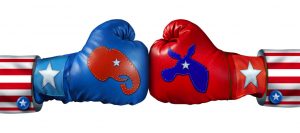Were you as shocked as I was about the outcome of the U.S. presidential election the other night? I did not see that coming. We all have our opinions, but I for one was not so happy with the result. At least in the U.S., though, we have Congress, we have the courts, and we have lots of other good, solid institutions in place that will protect us from whatever excesses the next president might have on his mind (like, for example, jailing his political opponents or barring Muslims from entering the country).
There’s a lesson here for peace processes. Folks like Roland Paris have written about the dangers of holding elections too soon after a peace accord intended to end a civil war. He argues that it’s important to build good institutions first. This used to be too abstract for me (like what “institutions”?). Now I get it though, because I am counting on the institutions of our democracy to keep our president-elect from turning into a dictator.
Elections  are inherently adversarial and competitive. In most places, there is one president (and/or one prime minister). There is a winner and a loser–no win-win, integrative solutions here. That means campaigns tend to drive up competitiveness and divisiveness. (What? Divisiveness? We Americans have no idea what you’re talking about.) And if you’re just coming out of a civil war or an armed insurgency, that’s a real problem. Those other people were just killing your people, and vice versa. If their side gets into office, they’ll have free rein to do more of that, right?
are inherently adversarial and competitive. In most places, there is one president (and/or one prime minister). There is a winner and a loser–no win-win, integrative solutions here. That means campaigns tend to drive up competitiveness and divisiveness. (What? Divisiveness? We Americans have no idea what you’re talking about.) And if you’re just coming out of a civil war or an armed insurgency, that’s a real problem. Those other people were just killing your people, and vice versa. If their side gets into office, they’ll have free rein to do more of that, right?
Enter institutions: disciplined, accountable police… an integrated military, not one for each side… an independent judiciary… These need to be built first, so those other people won’t have free reign to fire into crowds of your side’s peaceful protesters. And some power sharing arrangement in the interim–one in which both/all warring parties have some guaranteed role for a while–may be necessary.
Don’t get me wrong: democracy and elections are good. But timing is everything.
Liberia is a good illustration. Liberia suffered a terrible civil war starting in 1989. After a shaky peace agreement, an election was held hurriedly in 1997, less than a year after the 1996 peace accord. The man who started the war, Charles Taylor, won the election. Want to hear the ickiest campaign slogan ever? “He killed my ma, he killed my pa, I’ll vote for him.” Wow. People were still feeling insecure and were searching, I guess, for a “strong man” (a phenomenon that might help explain Trump’s victory, actually). They were also pretty convinced that if Taylor didn’t win, he’d go back to fighting. There wasn’t much to stop him. Upon taking office, Taylor quickly set about repressing his political opponents and lining his pockets with the people’s money. Not surprisingly, his former enemies went back to war. They felt they had no other options.
The second time around, things were different. The peace talks led to a transitional government with all major warring factions represented. A huge, multidimensional UN peace operation got to work helping (re)build institutions and disarming and reintegrating the rebels, and then the election was held in 2005, over two years after the peace agreement was signed. Things weren’t perfect, and I’m concerned President Sirleaf is getting a little too entrenched, but it’s a lot better than President Taylor and civil war. Liberia has remained at peace.
So if a peace accord is to succeed, elections need to be put off for a little while. There’s work to do first.
Insightful and delightful. Can I have a time machine please?
I assume that would be to fast-forward through the next four years? 😉